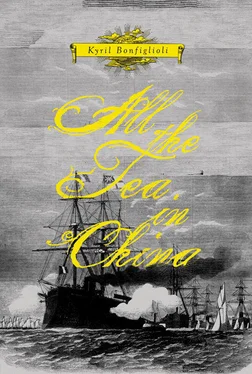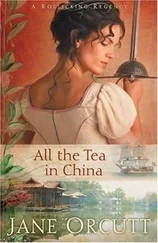The canoe-men would take us no further than a tumble-down trading post near the shore — and indeed, I would have been reluctant to risk my life and porcelain and Blanche on the sea in those clumsy little crafts. The agent at the trading-post looked as though he might once have been European but he was rotten with fever and stupefied with drink and could by no means be awakened. I rousted out a fat Parsee clerk who sold me rum for the paddlers and then dashed my spirits to the ground by saying that there was only one surf-boat and that it was alongside the ship, loading the last of the cargo. The ship, he added, would then set sail immediately. Indeed, he could now see the boat returning. I snatched the old brass spy-glass from his hands and saw that he was speaking the truth; a boat was heading for the shore in a leisurely fashion and there was unmistakable activity on the ship’s yards.
“How long for the boat to reach us here?” I snapped.
He shrugged his shoulders as only a Parsee can.
“Half an hour?”
He spread his hands out as though feeling for rain-drops.
It was clear that by no means could we reach the ship before she sailed.
“When will the next ship call?”
“Next season.”
Again I shed tears but this time they were tears of bitter chagrin. Robinson Caruso himself could have felt no more desolate a castaway than I.
“Ve could fire signal-gun,” said the Parsee nonchalantly, “but gunpowder is werry costly and every ounce is accountabled.”
A few minutes later I had bought half a pound of the costliest gunpowder in the world and the little brass gun by the flag-post was banging out three shots. I watched the ship agonisedly until I was sure that activity had ceased: some irritated officer had uttered the blessed cry, “Avast all that!”
The surf-boat was manned by the most curious people: whilst they were in their boat you would have thought them giants, for their chests were like barrels and their arms like thighs, but ashore they presented an extraordinary appearance on little, spindly bowlegs. They were of a tribe called Kroo-men, who are to be found all up and down the West Coast wherever there are boats to be worked. They sped us to the bar of the estuary; there was a flurry of spray and a corkscrewing motion then all of a sudden we were on the beautiful sea itself and pulling through the swell to the barquentine.
We were not welcome on the barquentine.
The captain was an uncouth fellow from Lancashire or perhaps Yorkshire and spoke a kind of patois English which was strange to me, but his meaning was clear: on no account was he permitted, or able, to take passengers. I pled, but to no avail.
“Gunpowder is werry costly,” I murmured under my breath — and gave him a shameful number of guineas, which made him recall that a Captain had discretion in these matters when saving lives was concerned. In a twinkling a whip was rove to a yard, my goods and Blanche were hove aboard and the anchor was weighed. The breeze was from the south-west, so it still bore the heavy scent of Africa, but I snuffed it with rapture.
The scent of the ship herself was not so rapturous to snuff, for much of our cargo was palm-oil, which stinks. She had come out laden with trashy Preston cotton-goods, Batley shoddy-cloth and some bales of old uniforms from the Napoleonic wars. (These last had made the ship — otherwise cleanly — to be infested with fleas at which Blanche complained bitterly until I explained to her that it was a privilege to give board and lodging to a flea whose ancestor might well have bitten the Duke of Wellington himself. Like all women, she was something of a snob, an attitude now fashionable since Queen Victoria herself took it up at the instigation of the man Albert.)
I signed the ship’s papers as Professor Mortdecai, occupation anthropologist. The captain was concerned about our lack of papers until I reminded him of the voracity of the termites on that Coast.

Neither Blanche nor I was in a condition to remark on the food until we were north of the Cap Verde Isles. When at last we were able to dine regularly with the Captain we did not regret the wasted days, for he kept a poor table. I recall the diet with hateful clarity: one day there would be Lancashire hot-pot, which is a thick, muddy mess of the worst bones from the neck of a starveling sheep, seethed with potatoes and onions to disguise, one supposes, their loathsome appearance. This horror would alternate with Irish stew, which is the same as Lancashire hot-pot but contains much more water, and Lob Scouse — a Liverpool dish of stewed vegetables and crushed ship’s biscuit, enriched with gobbets of fat meat. Each Friday there would be Blind Scouse, which is the same but without the gobbets, for the Captain, inexplicably, was a Roman Catholic. On Saturdays there was fat salt pork boiled with pickled cabbage and on Sundays there was, at an unconscionable hour, the weekly feast: a roast of beef from some elderly cow who was more to be congratulated on her longevity than her succulence, served with roast potatoes bobbing about in a sea of warm grease and segments of a firm, yellowish custard called Yorkshire batter. The Captain and his cloddish officers ate ravenously of this harmful ordure and seemed puzzled that Blanche and I preferred to staunch our stomachs with stale bread, rancid butter and what I suppose I must call cheese, for that was what they called it. My respect for those who build the British Empire grew at each meal: “’tis from scenes like this that Britain’s greatness springs,” as Lord Byron has said. Dyspepsia is the spur. With such a dinner inside him, it would be a strange man indeed who could not face the charge of Fuzzy-Wuzzy undauntedly; a strange missionary who could not preach the fiercest Old Testament passages with burning eloquence.
Thanks be to God — any God who chances to be thumbing through this essentially moral tale — our water-casks had become impossibly foul and so full of animalcules that even these iron-livered North Country men could not drink it, so our Captain put in to the Gran Canaria, at the mole called Las Palmas, so as to complete with water and, no doubt, bargain for more beasts of canonical age. For my part, I laid out a guinea on fresh fruit, a crock of butter, certain crusty loaves and a long, hard garlic sausage. I kept an eye open for the young person I had met there on my outward voyage — how long ago it seemed! — not with any lust in my heart, for I was now a married man and, moreover, too undernourished — but simply to reproach her for the infestation she had ungratefully rewarded me with and to press upon her a cake of the incomparable mercury soap. She was not to be seen; I like to think that she was in the confessional box.
This sausage, coupled with these fruits — I speak figuratively, of course — so restored our well-being that before we weathered Ushant I found myself once again able to reassure Blanche of the vigour of my devotion towards her; this, in turn, gave us both the appetite to warm ourselves in the increasing cold by eating a little of the hot and greasy messes of the Captain’s table, which now proved less offensive than they had seemed in the Tropics.
Nonetheless, it was with a great gladness that we heard the anchor-chain crashing through the hawse-hole in London River and our thanks and farewells to the Captain and his officers were, I fancy, not much more than perfunctory.
I had pasted great labels on my chests of porcelain, bearing the words “BRITISH MUSEUM”, and these, along with a sudden inability to speak anything but the most broken English, soon cleared me and our goods through the customs with no more than a half-sovereign tactfully laid out here and there. The cases, I, and Blanche were soon on a tax-cart, bumping towards St Botolph Lane. At Mr Jorrocks’s warehouse we were greeted by the M.F.H. himself. He peered at me amazedly, cried “Dash my vig!” from a full heart and indeed pulled off the very wig itself and dashed it upon the grocery-encrusted floor.
Читать дальше













